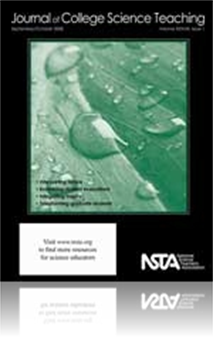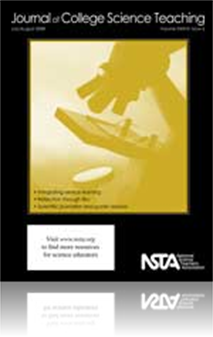All Journal of College Science Teaching resources
Journal Article
Point of View: The Scientific Method and School Science
Can we assume that science teachers and graduates understand the scientific method and the meaning of key terms such as theory, law, and fact? Selby (2006) notes that the “current debate about teaching Intelligent Design in science classes is revea...
Journal Article
It’s difficult for most professors to realize that what’s worked in the past won’t necessarily work with today’s students. Adopting new strategies and technologies is always hard, yet it’s amazing how quickly professors take to new instruct...
Journal Article
To address the confusion resulting from difficulties with proportional reasoning among preservice physical science students, a cube-assembly activity was used to bring a sense of concreteness to abstract ideas. The activity took students from the con...
Journal Article
Research and Teaching: Characterizing the Level of Inquiry in the Undergraduate Laboratory
Discrepancies abound in use of the word “inquiry.” In this paper, the authors propose a quantitative rubric designed to characterize the level of inquiry in laboratory activities and laboratory curricula. They do not wish to answer the question, ...
Journal Article
This quasi-experimental pilot study of nonscience majors taking a physical science course at a university in South Texas was conducted on Hispanic undergraduate students, and is theory based—an application of attribution theory. That the treatment ...
Journal Article
Using Natural History Interpretation as an Authentic Assessment Tool
Natural history interpretation offers college science instructors an educationally challenging alternative or complement to traditional evaluation methods, such as multiple-choice testing. Because it asks students to draw connections among varied con...
Journal Article
A Message from the NSTA President: Science Education—The Times They are A-Changin’
Inspired by her favorite Bob Dylan song of 1964, “The Times They Are A-Changin,” NSTA President Page Keeley’s presidential theme during her 2008—2009 tenure will be “From Transition to Transformation—Striving for a Science-Literate Nation...
Journal Article
Society for College Science Teachers: I’m in the “Thinking Business”
Teaching through inquiry doesn’t come automatically—professors have to think of instruction in a different way. Instead of describing information that students should know, they must challenge students to think at a higher, critical-thinking leve...
Journal Article
Scientific journalism, by definition, is writing concise, scientifically accurate, and engaging articles for nonexpert or lay audiences. When coupled with in-class poster sessions, it is a powerful and efficient mechanism for engaging and assessing s...
Journal Article
Environmental Service Learning: Relevant, Rewarding, and Responsible
At Georgia Southern University (GSU), a regional university of 17,000 students, environmental science is a required introductory course for all students. Consequently, environmental-biology class sizes are large, often approaching 1,000 students each...
Journal Article
Dubbed a “dialogue of life,” community immersion in preservice science-teacher education aims at providing a true-to-life and empowering opportunity for prospective science teachers (both elementary and secondary) to become active participants in...
Journal Article
Lights, Camera, Reflection! Digital Movies: A Tool for Reflective Learning
At the end of a biology course entitled Ecology, Evolution, and Genetics, students were asked to consider how their learning experience had changed their perception of either ecology or genetics. Students were asked to express their thoughts in the f...
Journal Article
Editorial: Why I Want to Slug My Neighbor
“So, are you enjoying your summer off?” This innocuous question can be a source of frustration for educators during the summer months. It implies that educators are tranced-out in their mp3 feed while munching on fair-trade chocolate if they are ...
Journal Article
Research and Teaching: Implementing Inquiry-Based Learning in Teaching Serial Dilutions
The 5E model of inquiry-based learning was incorporated into a sophomore-level microbiology laboratory to increase student understanding of serial dilutions, a concept that is often difficult for most students to comprehend. Quantitative and qualitat...





